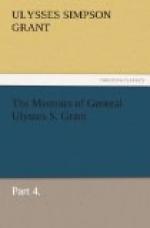moved up in like manner. Blacksmiths were detailed
and set to work making the tools necessary in railroad
and bridge building. Axemen were put to work
getting out timber for bridges and cutting fuel for
locomotives when the road should be completed.
Car-builders were set to work repairing the locomotives
and cars. Thus every branch of railroad building,
making tools to work with, and supplying the workmen
with food, was all going on at once, and without the
aid of a mechanic or laborer except what the command
itself furnished. But rails and cars the men
could not make without material, and there was not
enough rolling stock to keep the road we already had
worked to its full capacity. There were no rails
except those in use. To supply these deficiencies
I ordered eight of the ten engines General McPherson
had at Vicksburg to be sent to Nashville, and all
the cars he had except ten. I also ordered the
troops in West Tennessee to points on the river and
on the Memphis and Charleston road, and ordered the
cars, locomotives and rails from all the railroads
except the Memphis and Charleston to Nashville.
The military manager of railroads also was directed
to furnish more rolling stock and, as far as he could,
bridge material. General Dodge had the work assigned
him finished within forty days after receiving his
orders. The number of bridges to rebuild was
one hundred and eighty-two, many of them over deep
and wide chasms; the length of road repaired was one
hundred and two miles.
The enemy’s troops, which it was thought were
either moving against Burnside or were going to Nashville,
went no farther than Cleveland. Their presence
there, however, alarmed the authorities at Washington,
and, on account of our helpless condition at Chattanooga,
caused me much uneasiness. Dispatches were constantly
coming, urging me to do something for Burnside’s
relief; calling attention to the importance of holding
East Tennessee; saying the President was much concerned
for the protection of the loyal people in that section,
etc. We had not at Chattanooga animals
to pull a single piece of artillery, much less a supply
train. Reinforcements could not help Burnside,
because he had neither supplies nor ammunition sufficient
for them; hardly, indeed, bread and meat for the men
he had. There was no relief possible for him
except by expelling the enemy from Missionary Ridge
and about Chattanooga.
On the 4th of November Longstreet left our front with
about fifteen thousand troops, besides Wheeler’s
cavalry, five thousand more, to go against Burnside.
The situation seemed desperate, and was more aggravating
because nothing could be done until Sherman should
get up. The authorities at Washington were now
more than ever anxious for the safety of Burnside’s
army, and plied me with dispatches faster than ever,
urging that something should be done for his relief.
On the 7th, before Longstreet could possibly have
reached Knoxville, I ordered Thomas peremptorily to




